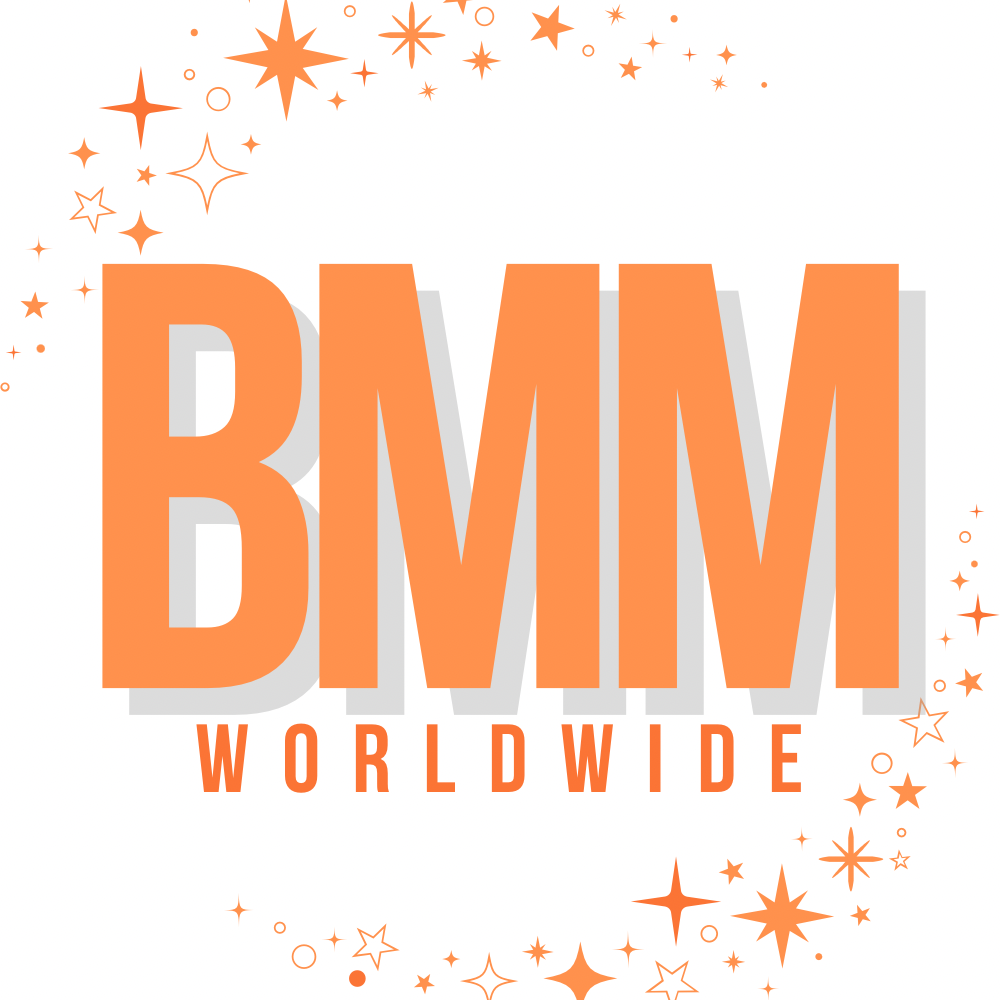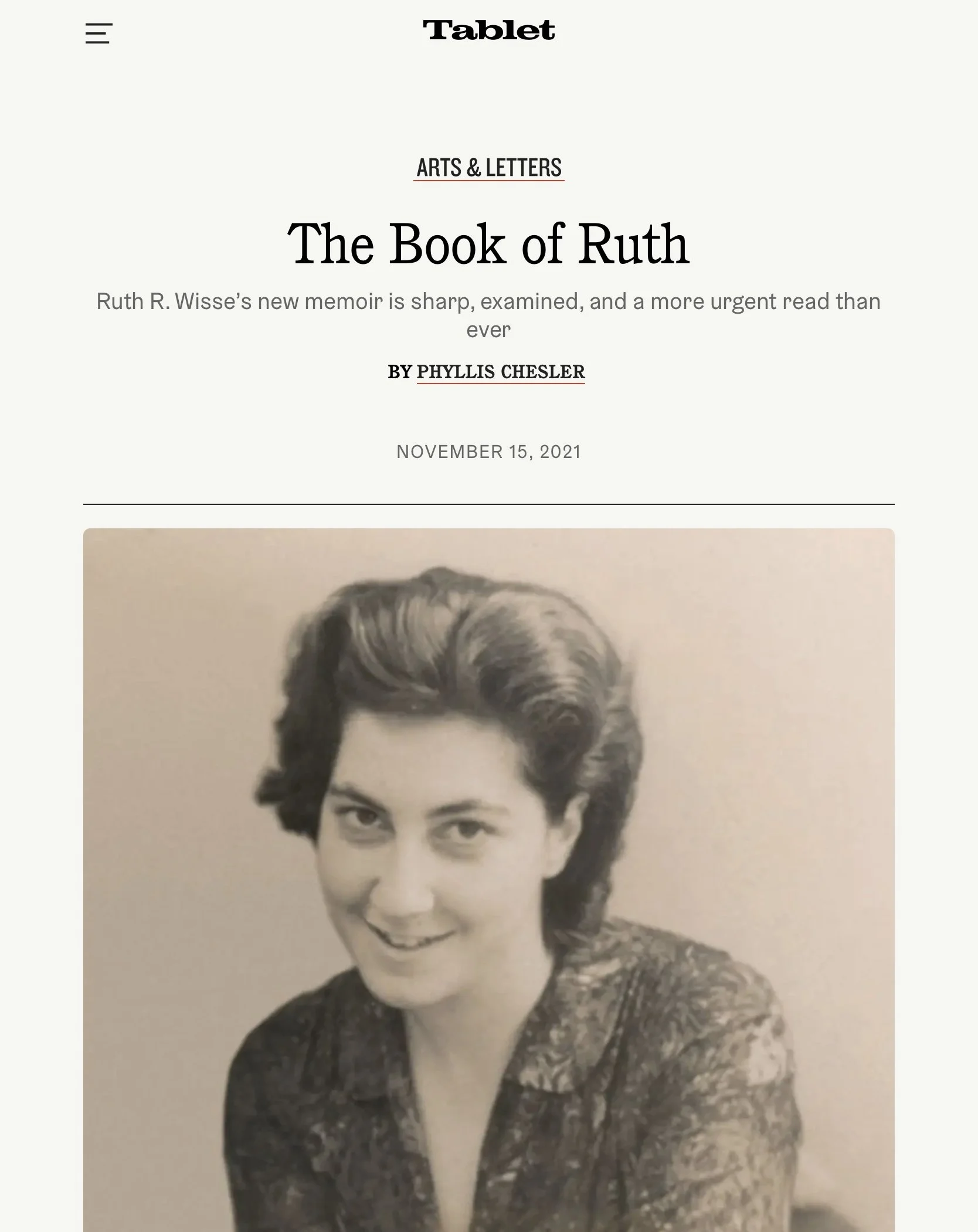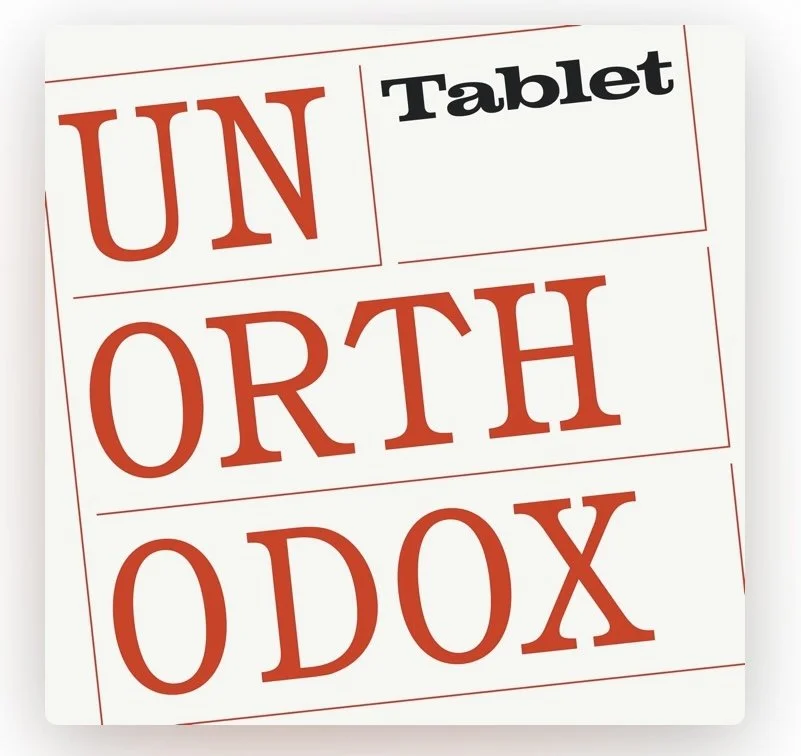“Ruth Wisse’s intellectual autobiography is a lasting work of profound moral force and scathing political discernment...Its illuminations are likely to be as urgent one hundred years hence as they are now.”
Like the poet John Masefield, I also suffer from “sea fever” and so down I went to the “seas again, to the lonely sea and the sky.” I needed no “tall ship,” only a room on the beach with a terrace—and all the time in the world to read Ruth R. Wisse’s new book, Free as a Jew: A Personal Memoir of National Self-Liberation.
Reader: I could not put it down. I still chose to read it slowly, to savor it, take it all in. I must have underlined at least a quarter of the book. Wisse commands an aerial view of Jewish history, bringing it to bear on Israeli politics and on the demonization of the only Jewish state. She continues to issue her clarion call about the plague of “political correctness” that threatens to devour the entire Western enterprise. more
Liel Leibovitz
Interviews Ruth Wisse about her new book, Free As A Jew. (Segment 2 of podcast)
“Ruth Wisse is one of America’s greatest thinkers. Her story is inspiring and uplifting — and, coming from an intellectual Jewish icon, a ringing reminder of what America is, and what we stand to lose should we lose it.”
“Never less than a scholar, she is at one and the same time street-fighter and prophet… Let others slide and shrink and vacillate, at least there is Ruth Wisse - forever resolute and fearless. ”
Harvard University Professor Emerita, Ruth Wisse escaped the Nazis and devoted her life as a female Jewish refugee to pioneering women’s equality in the academy and amplifying the literary voice of her decimated people.
After enjoying an illustrious career in the intimate company of the American Jewish literary and intellectual elite, mostly men of the left and “deaf to Jewish needs when it counted most”, “the most powerful champion of the Jewish people” now finds herself having more in common with her Christian neighbors and “a combatant in the war for the future of America.”
With praise from Cynthia Ozick, Howard Jacobson, Ben Shapiro, Eric Metaxas, Liel Liebovitz, and Norman Podhoretz among many others
presents
“Ruth Wisse has emerged as the most powerful champion in our time of the Jewish people—its history, its culture, and its unique position at the heart of Western civilization.”
“Ruth Wisse’s intellectual autobiography is a lasting work of profound moral force and scathing political discernment; of a passionately lived education that is itself a transforming education for the reader; of a family record of refuge and character that is also the history of a people. And more: at its fiery heart is the teaching of a language and its literature — Yiddish, born and rooted in polyglot Europe, while its storytellers and poets everywhere and always retain the meanings of Genesis.
Free as a Jew can be read as a history of the future. Its illuminations are likely to be as urgent one hundred years hence as they are now.”
“Ruth Wisse writes with the incisive, unforgiving tools of an engraver. When she speaks of the Yiddish novelist Mendele Mocher Sforim’s ‘bruising candour’ she could be describing herself. Never less than a scholar, she is at one and the same time street-fighter and prophet, intrepid in her enunciation of the three great, unfashionable passions that inspire this fierce memoir: Yiddish culture and Yiddish writers; ‘the God-inspired civilization’ - that thing of more than learning and more than faith - that makes a Jew a Jew; and Israel. Let others slide and shrink and vacillate, at least there is Ruth Wisse - forever resolute and fearless.”
In a controversial new memoir, qua j’accuse, that features accounts of her relationships with singer-songwriter Leonard Cohen and Nobel Prize winning authors, Saul Bellow and Isaac Bashevis Singer, National Humanities Medal recipient and Harvard University Professor of Yiddish Literature and Comparative Literature Emeritus, Ruth Wisse writes that:
most leading American Jewish writers and intellectuals in the 1940’s, when Germany perpetrated the Holocaust and Israel declared independence, “were deaf to Jewish needs when it counted most”;
Harvard University, where Wisse taught for two decades, is “infested” with anti-Judaism;
the American Jewish establishment is refusing to exercise its power in the defense of Jews being assaulted on American streets today.
Chronicling a life that begins on the run with her and her family’s escape from the Nazis at the age of four, and the transformation of their new Montreal home into a literary and intellectual Casablanca where rafts of fleeing Jewish poets, novelists and thinkers found safe harbor and support for their work, Wisse takes us with her on the path of a trail-blazing, female political refugee who fought to gain equality for Jewish literature and Jewish women in the academy.
Pulling no punches, she eviscerates the young Leonard Cohen, an aspiring novelist before he turned songwriter, for grossly misrepresenting his involvement with a disabled child in his debut novel, The Favorite Game. Based on experiences Wisse and Cohen shared at a Canadian summer camp, she writes that it “gave her an insider’s view of how fiction distorts truth, and punctured some of her reverence for literature, and for him”.
Wisse lambasts a veritable Who’s Who of post war, American Jewish literary icons. Some of them are former friends and esteemed colleagues like Irving Howe, whose socialist beliefs led him to support groups like Peace Now and who typified what she calls “the rot” and “moral somnambulance” of so many American Jewish intellectuals who “toyed with Israel’s security from abroad… like spectators at Roman gladiatorial games turning thumbs down on their own brothers”.
Now approaching her eighty-sixth birthday, Ruth Wisse’s status as doyenne of conservative Jewish public intellectuals is secured by a large and influential body of work, her exalted position among a virtual Valhalla of pundits and literati, a half century of research and teaching at the highest levels in the academy, and the unabashed affection of detractors who, while taking issue with her positions, respond to her openness and lamented her retirement from the Harvard faculty in 2014.
“In this profoundly moving account of her extraordinary life, Ruth Wisse displays what it means to deserve our freedom and to earn our glorious Jewish inheritance. A joyous exponent of great Yiddish literature, a fierce defender of Israel and Jewish teachings, and a fearless opponent of resurgent Jew-hatred and its silent abettors, Wisse inspires us to liberate ourselves by following her example. A must read!”
“Ruth Wisse’s memoir, like the great literature she taught generations to cherish, is a study in how our fierce attachments shape us, and how we, in turn, shape our modern moment by affirming our ancient covenants. Her voice, like that of Hebrew prophets from time immemorial, is an invitation to revel in the only sort of freedom that lasts, the freedom to embrace our tradition together, with joy and with strength. Always, but particularly in these troubled times, Ruth Wisse is indispensable.”
“Ruth Wisse’s compelling memoir unfolds in vivid detail, personal experiences intimately braided together with momentous historical events—Lisbon in the 1940s with Jews escaping the rising European storm; Yiddish poets in hardscrabble kibbutzim during Israel’s struggling early years; fierce ideological battles at Harvard faculty meetings as the deadening hand of political correctness descends. It’s not just revelations about Leonard Cohen, Saul Bellow, Irving Howe, Larry Summers, and other unforgettable characters in Wisse’s life (grandmother Fradl, the most beautiful woman in woman in Vilna, moved me to tears) it’s Wisse’s clear, astonishingly honest, original voice that makes this book a must-read. Ruth Wisse is a brilliant, courageous and passionate defender of the Jewish people and the Jewish State—and Ruth Wisse is great company.”
“Ruth Wisse says her life has taken the form of an unpayable debt. She is right – but it’s a debt we all owe to her, for a lifetime of uncompromising advocacy for Israel and the Jewish People that this brave, honest and vital book so captivatingly chronicles. It is essential reading for anyone interested in the Jewish past and in the dangers – and possibilities – of the American future.”
“From the center of the storm comes a dishy and damning memoir from the woman who brought Old World Yiddish scholarship and intellectualism back from the dead. Deliciously, Ruth Wisse is revealing all: the gaffes and regrets, the egos and arrogance, the heckling, the joys and the soul-crushing sadness. But even more, this book lands as a battle cry to our youth and the entire community. Hurry! Our heritage is so rich and our enemies so insidious. There is little time with everything to lose and even more to gain. ”
Reading Ruth Wisse
A Guided Discussion Group led by Edward Rothstein, Critic-at-Large for the Wall Street Journal since 2015, having previously served as Critic-at-Large at the New York Times. Throughout the course, Rothstein will be joined by a series of guest interlocutors. Register.
Media
Eric Metaxas
August 25
WSJ Op-ed
August 8
Spectator
Sept 13
Tobin podcast/JNS
Aug 26
Times of Israel
Sep. 12
Jonathan Tobin review
Sep. 24
Jerusalem Post
Sarah Ben-Nun
Sep. 27
Jerusalem Post
Gil Troy
Sep. 28
Powerline
Paul Mirengoff
Oct. 10
Jewish Journal
Shelly Sackett Oct. 14
Commentary
Rick Richman
Oct. 18
JNS
Melanie Phillips
Oct. 29
Dinesh D’Souza Podcast
Nov. 23
Tablet
Phyllis Chesler
Nov. 15
Law & Liberty
Juliana Geron Pilon
Nov. 24
Times of Israel
Matt Abelson
Nov. 25
Quillette
“We never looked back”
Nov. 27
Docemet
Gabriel Noah Brahm
Nov. 30
Haaretz
Eric Joffe
Dec. 16








